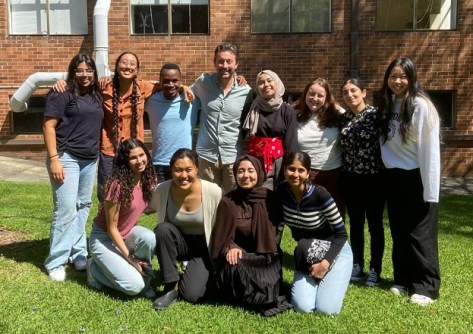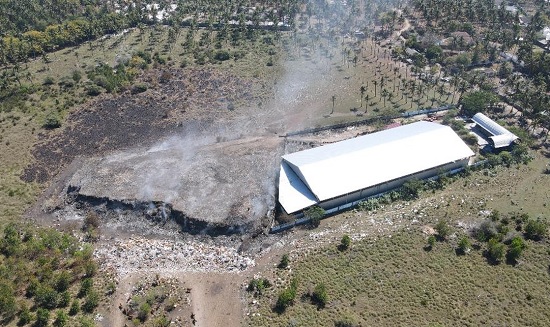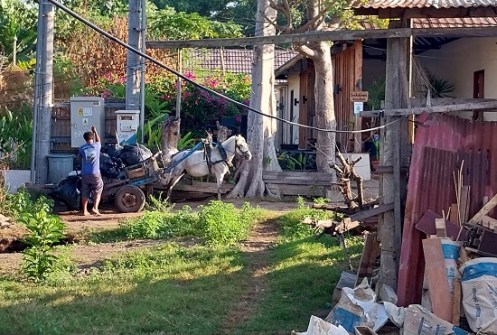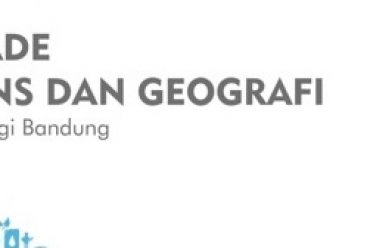Environmental mapping mission in the Gili Islands
By jnally on 20 March, 2024

A mapping and humanitarian engineering project on Indonesia’s Gili Islands is tackling community needs.
By Dr Alfita Puspa Handayani and Dr Craig Roberts
The three Gili Islands, located in North Lombok, Indonesia, have long been a tourist attraction due to their beautiful beaches and stunning coral reefs. However, behind their natural charm, these islands face issues affecting the sustainability of the economy and livelihoods of the residents, the most pressing of which are waste management and clean water supply.
In the wake of the 2018 earthquakes in Lombok, Dr Alfita Puspa Handayani from the Faculty of Earth Science and Technology at the Institute of Technology Bandung (ITB), Indonesia, is adapting her PhD research, which focused on land value prediction and land administration, to offer tangible solutions for communities in the Lombok and Gili regions.
In partnership with Dr Craig Roberts and Dr Andrew Dansie from the School of Civil and Environmental Engineering (UNSW), an innovative new Humanitarian Engineering project to address waste management, environmental conservation, clean water infrastructure and land administration concerns is evolving. ITB students will bring their geospatial and mapping expertise to combine with the broader UNSW engineering skills.
Humanitarian Engineering (HE) is a new minor offered within the Bachelor of Engineering (Surveying) at the University of New South Wales (UNSW). With a close eye on the UN Sustainable Development Goals, HE connects people and problems, and combines science, social science and arts to create, design, develop and enhance technologies and processes that promote the well-being of populations facing significant challenges. Geospatial science enables visualisation of how communities interact with their environment, highlighting trends and patterns in their behaviour which inform better solutions to social problems.
However, engineering solutions are futile if there is no community ‘buy in’ and due consideration given to the context within which a technical solution operates. Will communities adopt new practices? Will businesses support these changes? What is the cost? Are there legal ramifications? Are proposed solutions adaptable, scalable or specific for the Gili Islands? Are these solutions sensitive to cultural and religious practices of island residents? Will these solutions make a measurable difference to the lives of all who reside on the islands?
Gili Trawangan, the largest of the three islands, has a larger population and more tourist facilities, including hotels, cafes and bars spread across the 338-hectare island. According to data from 2018, up to 20 tonnes of waste can be produced on the island per day. Concerns about the garbage issue began to arise among visitors in 2015.
The North Lombok provincial government has established an integrated waste management centre covering an area of 6,000 square metres on Gili Trawangan. However, it is apparent that this facility, including a large-capacity incinerator, will not be effective in resolving the waste issue if there is no waste separation at the household level.

Another issue arises on Gili Meno, concerning clean water supply. Most homes rely on government-built wells, which provide water that is often too salty to drink. Residents must instead purchase bottled water in 21-litre bottles, accounting for 10% of their income every month.
Under the guidance of Dr Handayani, using various brainstorming activities, students have been encouraged to comprehensively examine issues from multiple perspectives — assessing the current conditions, identifying gaps, mapping behaviours, compiling a list of possible solutions, and evaluating community acceptance and likely implementation. Students must also calculate the financial costs and ensure that materials and spare parts can be easily obtained at an affordable price. Capacity and time span are also considerations when assessing the feasibility of implementing alternative solutions.
Two groups comprising seven UNSW students proposed a solution for waste management and clean water issues. The first group, which focused on waste management, found that the root cause of the problem in Gili is the community’s understanding of waste and the need to raise awareness of managing it. For this, the students explored the behaviour of the community and found a crucial need for education and public awareness regarding waste processing and efforts to implement household-scale waste management. It was found that using social media and enlisting well-known individuals as advocates for the community is an effective strategy. From the behavioural insights, it was inferred that people tend to listen to public figures. Geospatial tools can also be enlisted to map human behaviour and monitor community understanding of waste management. Socialisation and education can then be targeted accurately to improve understanding at the household level.
The second group concentrated on initiatives to supply clean water and assessed three approaches for rainwater treatment and filtration: UV purification, ultrafiltration and chlorine disinfection. Community behavioural investigations found that people in Indonesia are not accustomed to drinking water directly without boiling it first. The boiling process would render chlorination ineffective but boiling costs a lot of energy. Therefore, students decided to investigate a UV purification and ultrafiltration system as a possible solution for the clean water system. Mapping well locations, the proximity between clean water locations and the clean water distribution routes, will provide a more comprehensive solution to the issue of water availability on the island.

Both outcomes demonstrate how HE operates, involving knowledge about habits, traditions and characteristics to ensure that the proposed solutions are targeted and most likely to be accepted and implemented by the local community.
Dr Handayani will introduce HE concepts to students at the ITB and encourage them to leverage their expertise in land administration, geospatial science and mapping to ensure that engineering solutions are not only technically sound, but also legally and environmentally sustainable in the long term. The combined ITB and UNSW team plan to visit the Gili Islands in late 2024 to combine staff and students in a hands-on joint project whilst engaging deeply with the community.
Dr Alfita Puspa Handayani is a Lecturer specialising in Land Administration from the Faculty of Earth Science and Technology at the Institute of Technology Bandung, Indonesia. Dr Craig Roberts is a Senior Lecturer in Surveying/ Geodesy from the School of Civil and Environmental Engineering, University of New South Wales. UNSW students will receive funding from the New Colombo Plan. The authors acknowledge the funding provided by the WCU Funding Grant from the Faculty of Earth Science and Technology at ITB.
This article was first published in Issue 129 (Feb/Mar 2024) of Position magazine. Please consider subscribing.
Hits: 116

